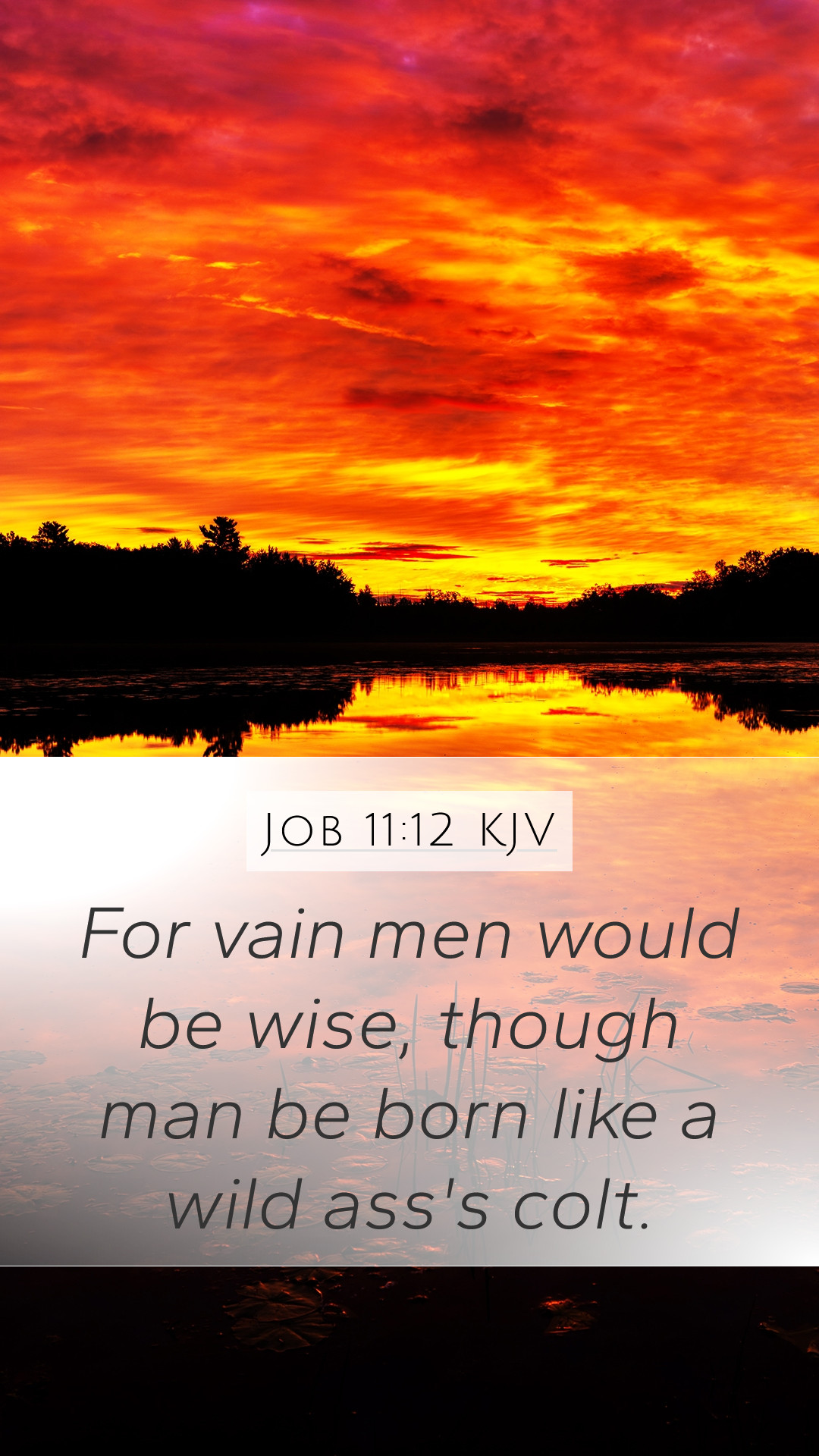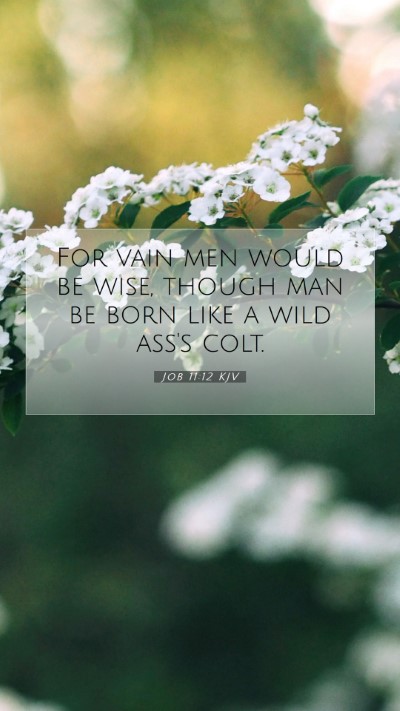Old Testament
Genesis Exodus Leviticus Numbers Deuteronomy Joshua Judges Ruth 1 Samuel 2 Samuel 1 Kings 2 Kings 1 Chronicles 2 Chronicles Ezra Nehemiah Esther Job Psalms Proverbs Ecclesiastes Song of Solomon Isaiah Jeremiah Lamentations Ezekiel Daniel Hosea Joel Amos Obadiah Jonah Micah Nahum Habakkuk Zephaniah Haggai Zechariah MalachiJob 11:12 Meaning
What is the meaning of Job 11:12?
For vain men would be wise, though man be born like a wild ass's colt.
Job 11:12 Bible Verse Meaning
Bible Verse Meaning: Job 11:12
Job 11:12 states: "But a man is not so; he is born like a wild ass's colt." This verse is part of a larger discourse where Zophar, one of Job's friends, attempts to assert the nature of human beings and their innate foolishness in contrast to God’s wisdom.
Overall Summary of the Passage
In this statement, Zophar implies that humans are born with a natural tendency towards foolishness, akin to the wild instinctual nature of a colt. This can be seen as a critique of Job's search for understanding and righteousness amidst his suffering. He emphasizes that true understanding comes from God alone and that Job's questioning reflects the folly of mankind.
Insights from Public Domain Commentaries
-
Matthew Henry's Commentary:
Henry elucidates that this verse speaks to the inherent nature of humanity, suggesting that without divine wisdom, people are likened to untrained animals, wild and untamed. The commentary suggests that Zophar's harshness reveals more about the speaker’s lack of empathy and understanding than about Job's situation.
-
Albert Barnes' Notes:
Barnes points out the comparison drawn by Zophar between man and a wild ass’s colt, indicating that humans, absent the guidance and teaching of God, are likely to be devoid of direction or purpose in life. He interprets this as a reminder that reliance on God is essential for true wisdom and understanding.
-
Adam Clarke's Commentary:
Clarke emphasizes the cultural context, noting that Zophar’s statement may reflect a common perception of human nature in ancient times, which saw humans as obstinate and wild, requiring discipline. Clarke also discusses the implications this has on the broader themes of suffering and the quest for wisdom throughout the Book of Job.
Analysis of Key Themes
Job 11:12 touches on multiple crucial themes in the Scripture:
-
Human Folly:
This verse emphasizes the foolishness of humanity in thinking they can fully comprehend God's ways. Zophar argues that men are inherently foolish without divine revelation.
-
Divine Wisdom:
Zophar contrasts human limitations with God's omniscience. True wisdom and understanding are viewed as gifts from God, which are not accessible by mere human effort or intellect.
-
Suffering and Righteousness:
This conversation underscores Job's plight and raises questions about the nature of suffering. Why do the righteous suffer, and what does this say about God’s justice?
Application of Job 11:12
In applying the insights from Job 11:12 to daily life, the following points can be considered:
- Recognize human limitations and the necessity for divine guidance in making decisions and understanding the world.
- Embrace humility in the pursuit of wisdom and understanding, acknowledging that true insight comes from God.
- Reflect on personal experiences of suffering, recognizing that they may help cultivate deeper faith and reliance on divine wisdom.
Cross References
Job 11:12 can be related to the following verses:
- Job 4:17-19: Discusses human nature and questioning God's justice.
- 1 Corinthians 1:25: Outlines the idea that God's foolishness is wiser than human wisdom.
- Psalms 51:5: Acknowledges the inherent sinfulness and folly present in human nature from birth.
Conclusion
Job 11:12 serves as a poignant reminder of the limitations of human understanding in the face of divine wisdom. Through the critical examinations by various commentators, one can derive deep insights into the fundamental nature of humanity and the importance of seeking God's guidance in all aspects of life.
For those engaging in Bible study, this verse invites believers to explore bible verse meanings, bible verse interpretations, and understanding Scripture through collective studies, discussions, and reflections.


